© 2026 ALLCITY Network Inc.
All rights reserved.

Before Monday, the last time the Coyotes played in Canada was on March 9, 2020, three days before COVID-19 shut down the world. They turned in such a disappointing performance in Winnipeg that night that wholesale changes felt inevitable.
Twenty months later, the Coyotes returned to Winnipeg with a new GM, a new coaching staff, a handful of holdover players, and no expectations. Arizona was 1-9-2 all-time at Canada Life Centre, the Jets had playoff aspirations and the Coyotes had lottery aspirations.
None of that mattered for one game.
The blueprint the Coyotes followed on Monday was anything but ideal, but Karel Vejmelka made 46 saves for his first career shutout, Antoine Roussel scored his second goal in as many games — this one off a beautiful backhand saucer pass from Loui Eriksson — and the Coyotes stunned the Jets, 1-0, for their fifth win of the season and their first shutout.
“Thank god we had Veggie,” coach André Tourigny said. “Honestly tonight, I think it’s payback time for some games early in the season when we played really well and we couldn’t find a way to win. I don’t think we played very well offensively. We lacked execution, but I still liked the way the guys fought.”
After an 0-10-1 start, Arizona is 5-5-1 in its past 11 games, and has allowed two goals or fewer in seven of its past 10 games.
“We’ve come a long way,” said forward Christian Fischer, who returned to the lineup after a seven-game absence with an upper-body injury. “Guys are starting to find their way, their roles and we’re kind of getting some consistency with linemates. That’s always positive.”
Here are five takeaways from an unexpected win in Winnipeg.
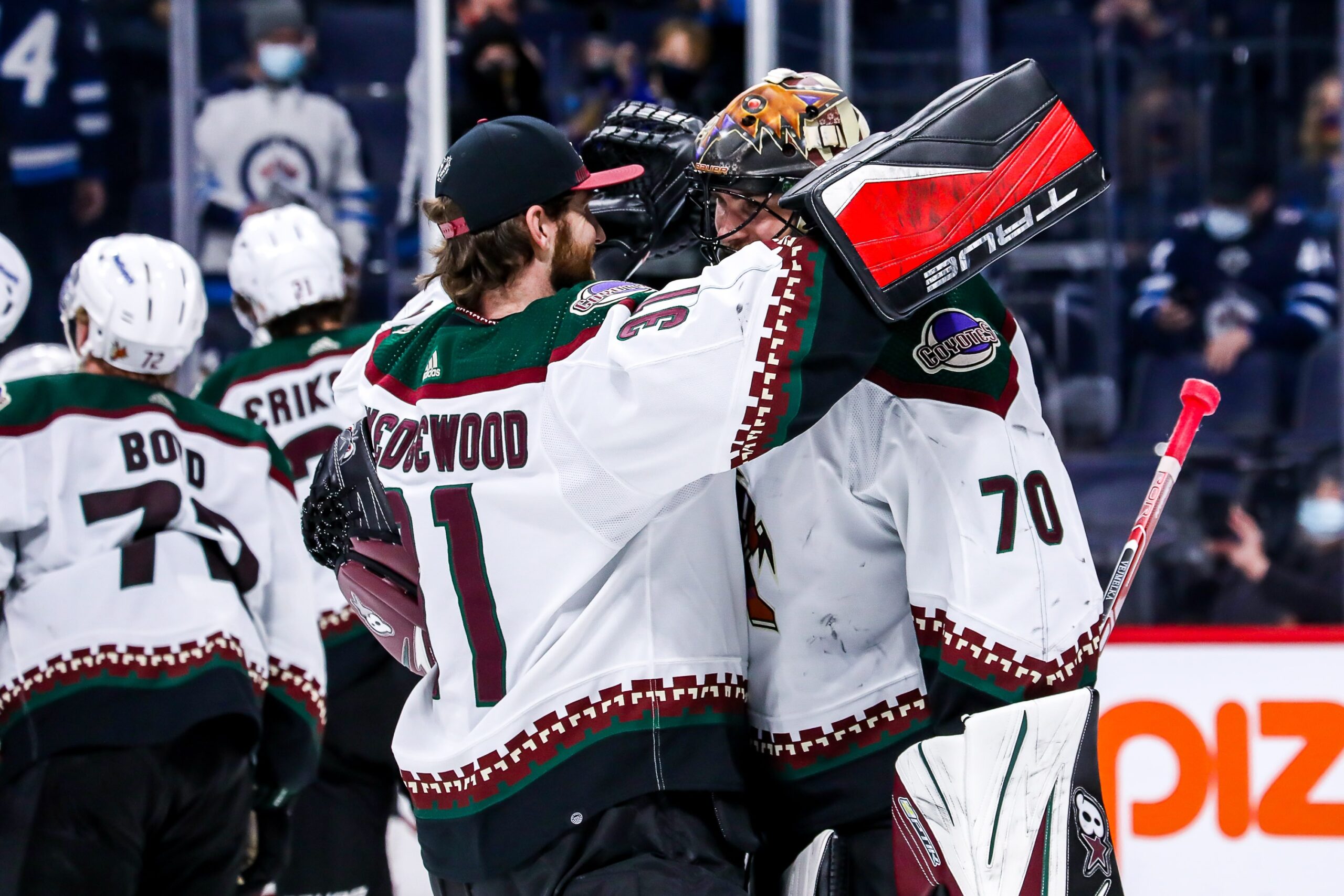
Veggie’s take
When rookie goaltender Karel Vejmelka experienced a dip in play after his storybook start, goalie coach Corey Schwab shrugged it off as a minor concern.
“To think that that was just going to continue would be probably very high expectations for him,” Schwab said earlier this month, reminding everyone that Vejmelka had never played in North America, let alone the NHL. “This is a little bump in the road right now, but to me, he’s approached it the right way and he’s going to continue to work and come out of it on the right end.”
Man, has Vekjmelka come out of it on the right end. With Scott Wedgewood relieving some of the pressure and workload, and with the Coyotes playing better, if not ideal defensive hockey, Vejmelka has stopped 83 of the past 84 shots he has faced in his last two starts after a one-week break to fine-tune his game.
Vejmelka’s 46-save shutout on Monday tied the Atlanta Flames’ Dan Bouchard (Dec. 13, 1972 at Detroit) for the most saves in a first career shutout since the NHL began tracking saves in 1955-56. Only six rookies in NHL history have recorded 46-plus save shutouts.
“Obviously, all credit goes to him,” Fischer said. “What a performance. Well deserved. So happy for him to get a win and a shutout on top of that.”
As everyone knows by now, Vejmelka wasn’t even supposed to be with the club this season. Most projections had him playing in Tucson as Ivan Prosvetov’s backup, but a strong training camp and preseason earned him the backup spot.
In 14 games, he owns a 2.80 goals against average and a .916 save percentage.
“I can’t imagine this start for me,” he said. “I was dreaming about it. It’s an honor for me. I just enjoy every minute here and try to play 100 percent and try to win every game I play.”
Vejmelka said he planned to give the puck from his first NHL shutout to his father.
“He supported me every single game when I was a child,” he said.
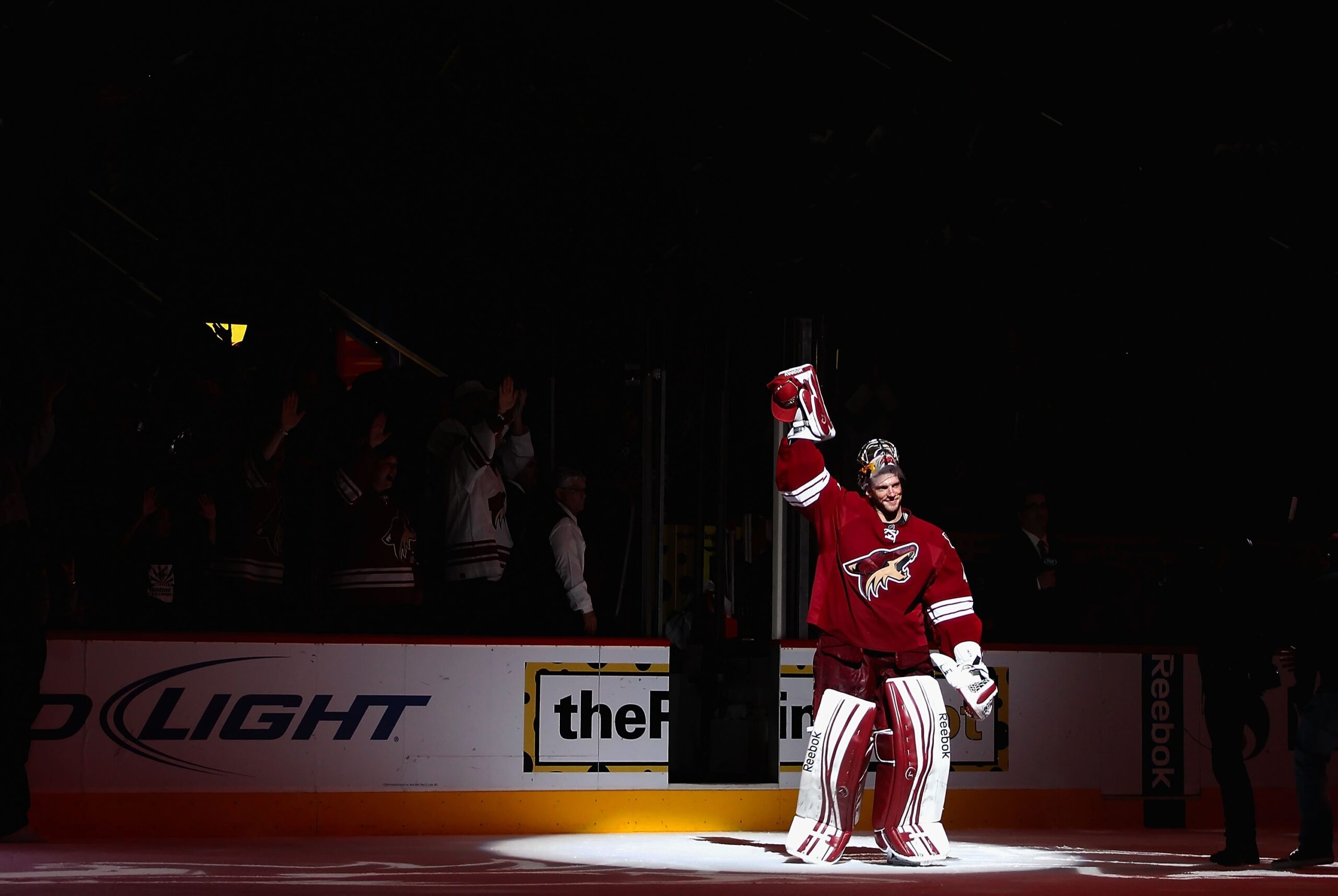
Flirting with history
Vejmelka’s 46-save shutout was eight saves short of Mike Smith’s franchise record 54-save shutout on April 3, 2012 vs. Columbus. Smith’s performance was an NHL record for nearly two years before Edmonton’s Ben Scrivens posted a 59-save, 3-0 victory over the visiting San Jose Sharks on Jan. 29, 2014.
Ten goaltenders in NHL history have posted shutouts with 50 or more saves.
Vejmelka became the fourth goaltender since 1955-56 to make 45-plus saves in his first career shutout. His 46 saves were also the second most in a shutout in Coyotes/Jets franchise history behind Smith. Here is that list.
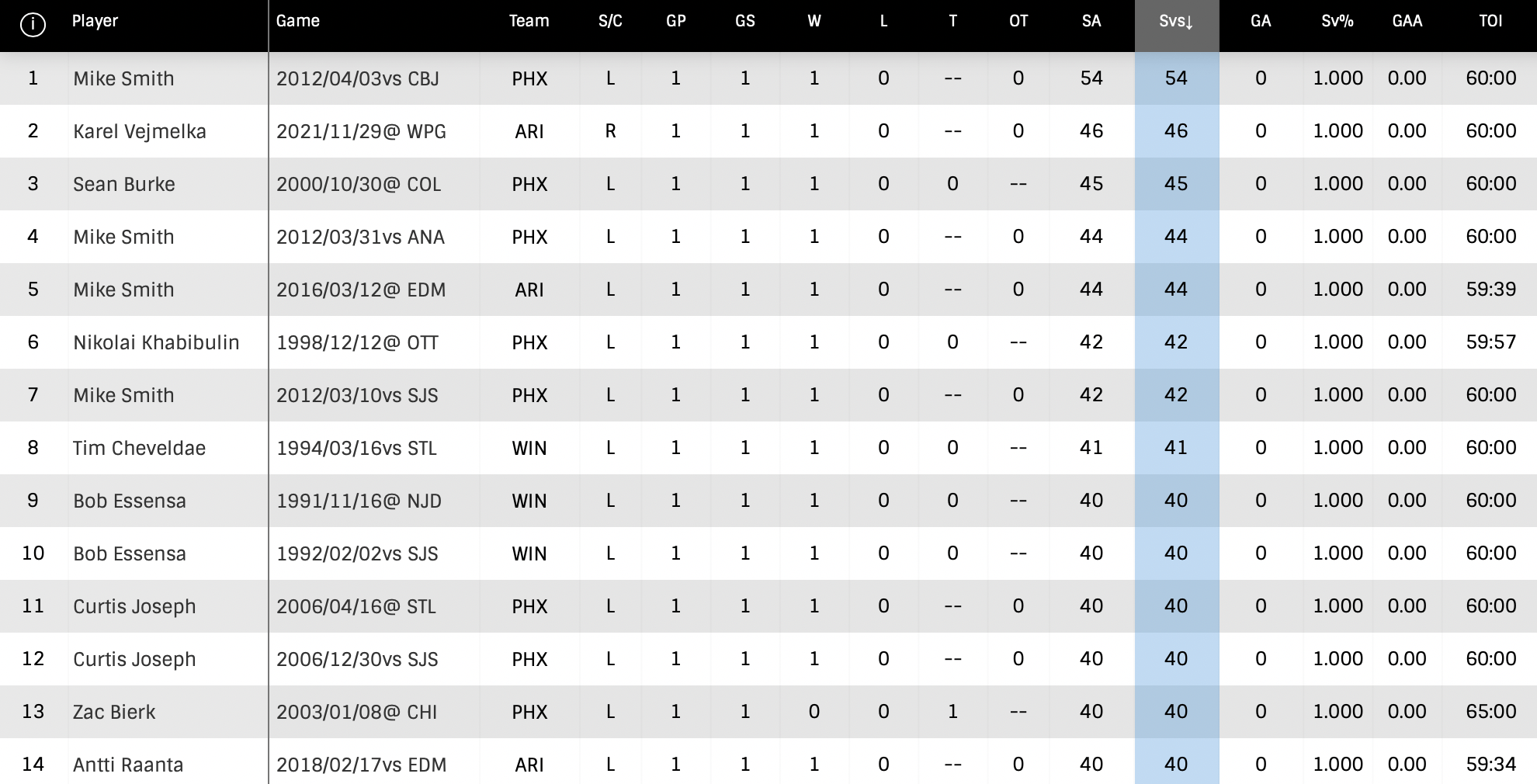
“Every single minute, we played really well as a team,” Vejmelka said. “My teammates did a really great job on defense and blocking shots, which was a big part of this win. It was a team win, and we need to keep it going right now.”
Monday’s win was the second in franchise history in which the Coyotes have won a game when they allowed 46-plus shots on goal and recorded 15 or fewer shots on goal. (Jan. 24, 2004 vs Detroit).
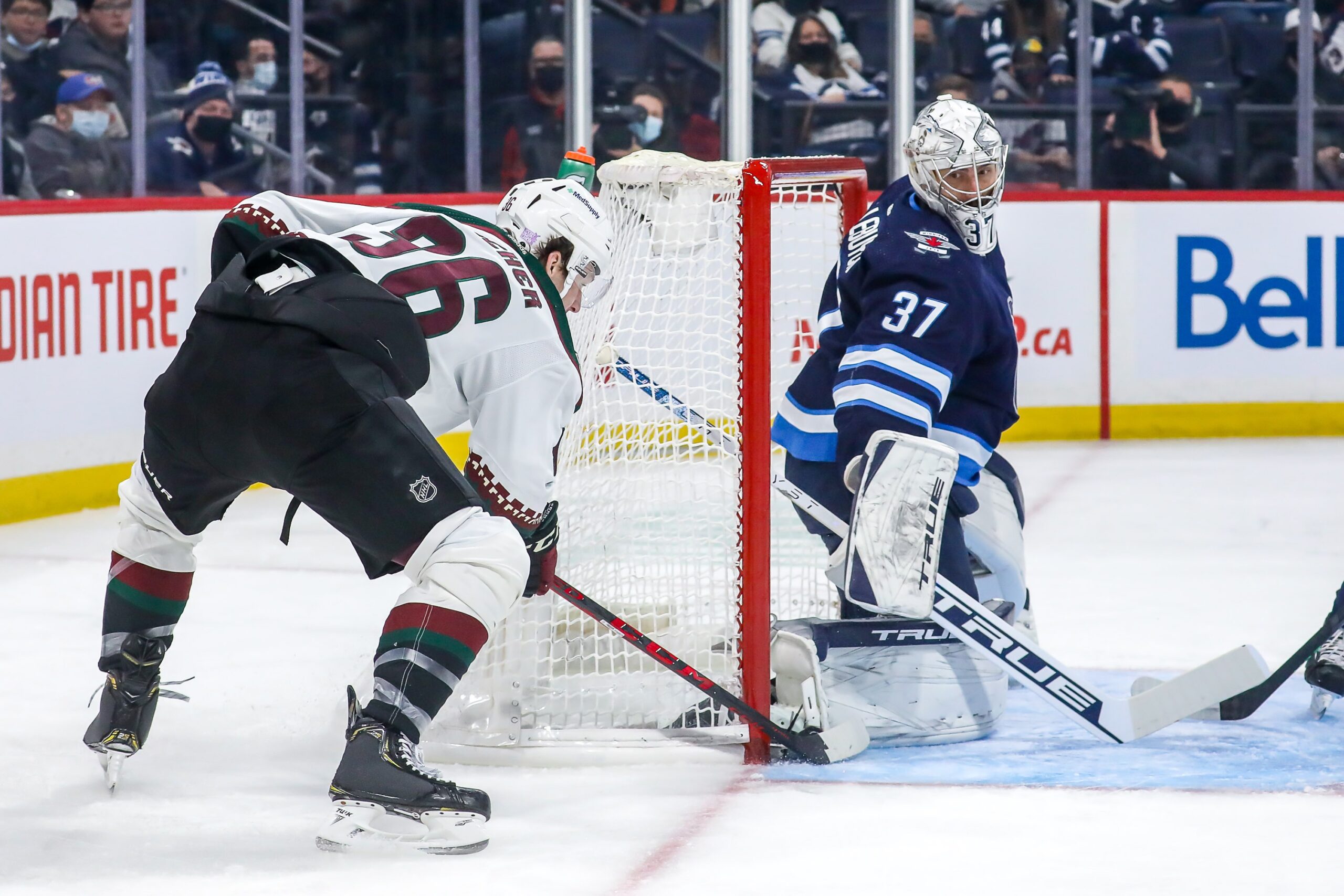
Fischer returns
When Christian Fischer suffered an upper-body injury on Nov. 12 in Chicago, he was originally listed as day to day. It took 17 days for Fischer to make it back, but in his return, he logged 16:49 of ice time, fourth most among Coyotes forwards.
When asked if Fischer was supposed to be on an ice-time limit like Ladd had been the game before, Tourigny smirked.
“I did not ask,” Tourigny quipped. “His cardio was fine. We had no restrictions on his ice time so I went with the flow. I liked his line with (Barrett Hayton and Lawson Crouse). I think they were heavy and they did a lot of good things defensively for us.”
The ice time was the second highest of Fischer’s season, eclipsed only by the season-opener in Columbus. It was also a promising sign for a guy who wants very badly to play up in the lineup and have more of an opportunity to impact games at both ends.
“I felt good,” Fischer said. “I think I’ve been skating five days in a row here so the legs felt good. Any time you miss an extended amount of games, your first shift or two or period, things are coming quick. You can practice all you want but guys aren’t killing you, guys aren’t hitting you, you ain’t blocking shots.”
Fischer recorded two shots on goal, two hits and one very painful looking blocked shot.
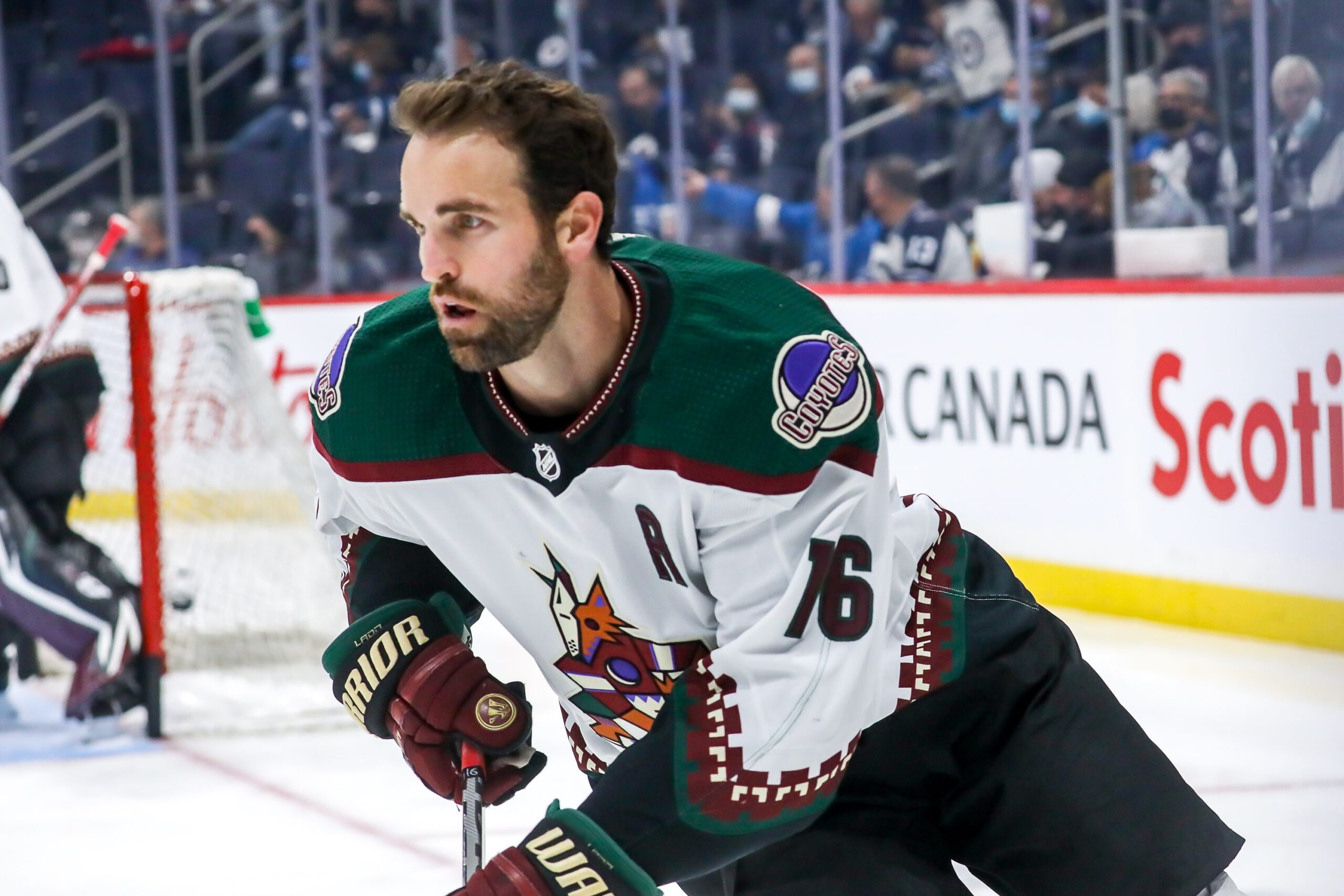
Ladd’s quiet homecoming
Andrew Ladd was never supposed to end up in Winnipeg. The fourth overall pick in the 2004 draft imagined he would play a long and illustrious career with Carolina, the team that drafted him. Even after the Hurricanes traded him to Chicago in 2008 for Tuomo Ruutu, he imagined a long and productive career with Chicago, where he won a Stanley Cup in 2010, helping the Blackhawks end a 49-year title drought.
The NHL has a funny way of altering plans.
Due to cap issues and a mix-up by GM Dale Tallon (in truth, it was then-assistant GM Stan Bowman’s fault) in qualifying three restricted free agents before the deadline, the Hawks were forced to trade Ladd (and more than 40 percent of their Cup-winning roster).
Ladd joined the Atlanta Thrashers for their final season in Atlanta before they moved to Winnipeg, and he spent nearly six seasons with the franchise. They were the best years of his career. In 429 games with the Thrashers/Jets, he had 139 goals and 305 points. He also spent six seasons as the franchise’s captain.
Ladd slipped into town quietly on Sunday. No Winnipeg media interviewed him about his time there, and no Arizona media were on the trip. It has been more than five years since that tenure so much of the significance has faded, but with Ladd in the twilight of his career, it is notable to remember just how good he was for a significant stretch of that career.
Ladd returned to the lineup on Saturday against Dallas after a bout with COVID-19. Coach André Tourigny had planned to play him between eight and 10 minutes but ended up playing him 12:24, and said he would have played him more had that been OK with the team’s medical staff.
“I wasn’t too bad,” Ladd said. “I think I was achy for a couple of days, I was congested and then a lot of fatigue for about a week. After that week, I started to feel better.
“I think the home-schooling of three kids was a little more demanding than anything, but we were able to get through it.”
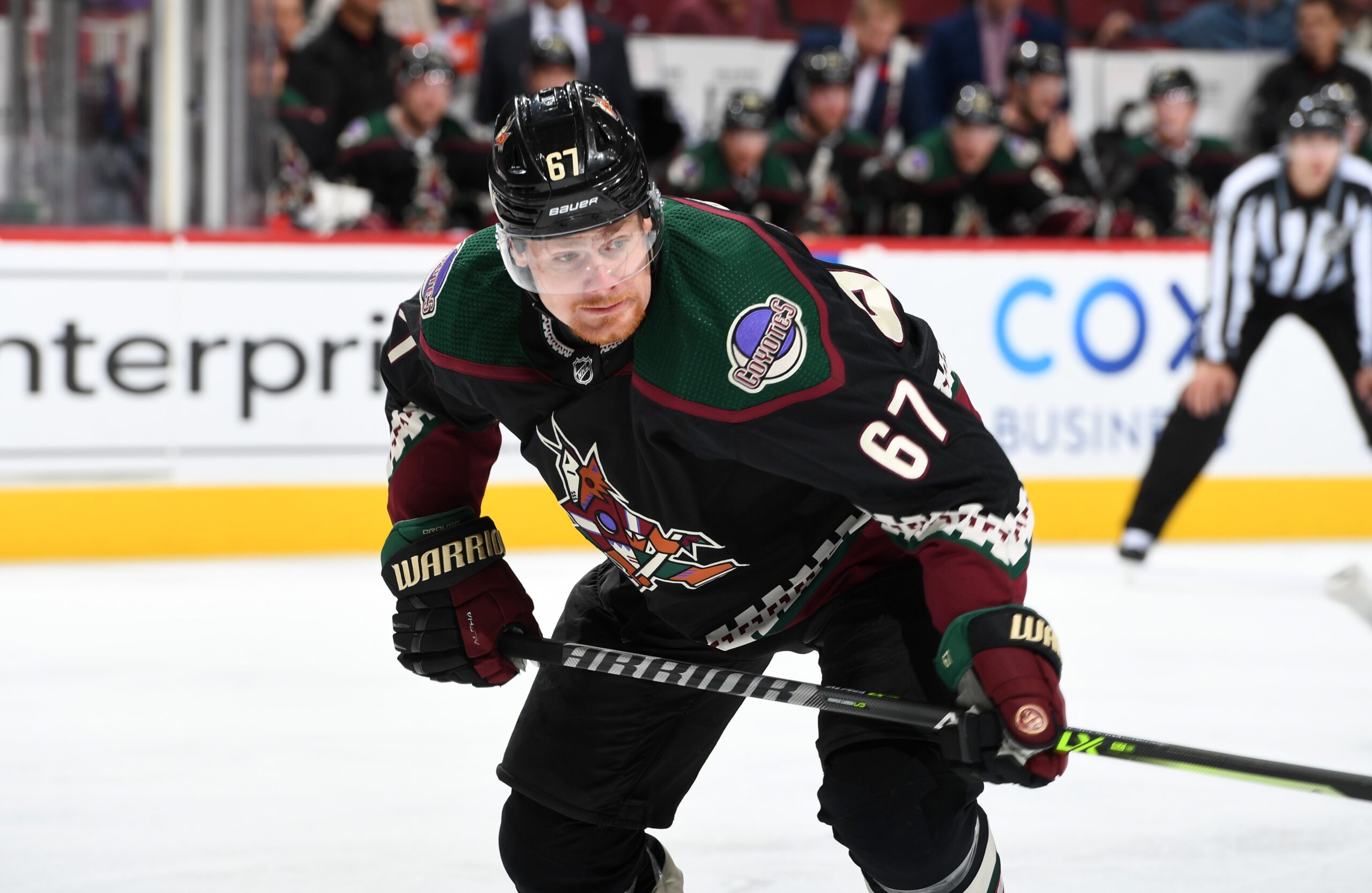
Middle-core management
One of the greatest concerns of the Coyotes’ ongoing rebuild was the impact that it would have on the middle core of players who might be here when the team emerges from this difficult period and is ready to contend for a playoff spot: Jakob Chyhcrun, Clayton Keller, Nick Schmaltz, Lawson Crouse and Christian Fischer
How will consistent losing without much hope of consistent winning impact their development, their confidence, their approach, and their belief in the organization?
We have already seen signs of frustration in heartfelt postgame interviews with Fischer and Crouse, and Chychrun’s inauspicious start was alarming because he is so important to this franchise’s future.
I asked GM Bill Armstrong about this when the Coyotes reached the quarter point of the season.
“I think that’s where coach (André Tourigny) has done a great job,” Armstrong said. “We have talked a lot about culture, and the biggest thing in culture is the process where you’ve got to come to work every single day and compete and practice hard. I think he’s really got the guys dug into that process and that takes away from a lot of the noise that can happen when you’re going through the rebuilding process.
“But let’s be clear about this: There’s no guarantee that even if a player would get moved to another club, that it’s a better situation. There’s guys that we’ve traded that are in the exact same situation that we are, so there’s no guarantee to say, as a player, that there’s a perfect situation out there. You can get traded from here into a worse situation where you don’t have that same amount of ice and that same amount of impact, and your team could still be struggling, so I think you just have to get people dug into the process and worried about making this club and this culture better every single day.
“I think all of our middle guys have done that. They’ve had struggles at times, but they have embraced it.”
Armstrong said he had open conversations with the players about the direction of the club, the multi-year plan, and their roles within it.
“I’ve had open conversations with everybody in this organization about where we’ve been moving to,” he said. “I didn’t want to hide it from coaches when I hired coaches, or from players that I met with in the summer. I wanted to be open and honest about it and put it on the table, telling them that, ‘This is the process, this is where we want to be in three years, this is what the expectations are from you.’
“We told them, ‘We’re an organization that’s moving forward to becoming a championship organization, and you’re part of the mix.”
Follow Craig Morgan on Twitter
Comments
Share your thoughts
Join the conversation



